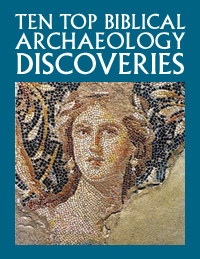
The coin bearing the image of Luna, the Roman moon goddess, above the sign of Cancer. Courtesy Dafna Gazit, Israel Antiquities Authority.
While conducting an underwater archaeological survey, a diver with the Israel Antiquities Authority (IAA) made an incredible discovery, a rare bronze coin with the image of Luna, the Roman moon goddess. Discovered off the coast of Haifa, the 1,850-year-old coin is the first of its kind ever discovered in Israel and attests to the interconnectedness of the Mediterranean world during the height of the Roman Empire (c. 27 B.C.E.–180 C.E.).

Minted in Alexandria, Egypt, during the reign of Emperor Antoninus Pius (c. 138–161 C.E.), the coin belongs to a series of Roman coins depicting the signs of the zodiac. While the newly discovered coin’s obverse bears the image of the emperor and notes it was minted in “year eight” of his reign (144/145 C.E.), the reverse depicts a crab, the zodiac sign of Cancer, beneath a portrait of the Roman moon goddess.

Jacob Sharvit of the IAA, with the newly discovered zodiac coin. Courtesy Yaniv Berman, Israel Antiquities Authority.
The coin was discovered during an IAA survey to locate, document, research, and preserve antiquities sites and ancient finds along Israel’s coast. The coin is the most recent of several discoveries made in the waters off Haifa and Akko, a region with a natural harbor that made it an important trade port for thousands of years. According to Jacob Sharvit, director of maritime archaeology for the IAA, “This is the first time such a coin has been discovered off Israel’s coast and it is a rare addition to the National Treasures’ collection. Israel’s Mediterranean shores and waters have yielded many archaeological sites and finds that attest to connections in antiquity between Mediterranean ports and the countries along it.”
Emperor Antoninus Pius and a Peaceful Empire
Antoninus Pius is remarkable among Roman emperors for the incredible peace and tranquility that characterized his 23-year reign. Known as one of the five “good emperors,” Antoninus was the first emperor never to have participated in military combat. Instead, his reign witnessed great prosperity as he focused predominantly on the empire’s civil administration.
Having inherited the throne from his father-in-law Hadrian, Antoninus pardoned many peoples who Hadrian had sentenced to death, and he also improved relations with many peoples across the empire, including Jewish populations in the former lands of Judea and the Diaspora. Antoninus even revoked several of Hadrian’s decrees related to Jewish identity and worship and once again allowed the practice of circumcision.
Read more in BHD:
All-Access members, read more in the BAS Library:
https://www.baslibrary.org/biblical-archaeology-review/36/1/27
https://www.baslibrary.org/biblical-archaeology-review/43/4/4
Not a BAS Library or All-Access Member yet? Join today.The post A Roman Moon Goddess in Syria-Palaestina appeared first on Biblical Archaeology Society.


0 Commentaires